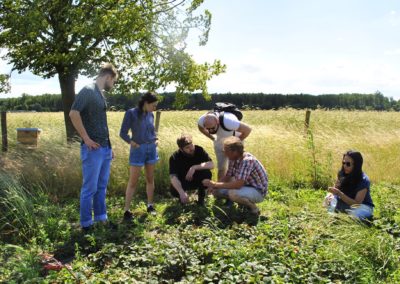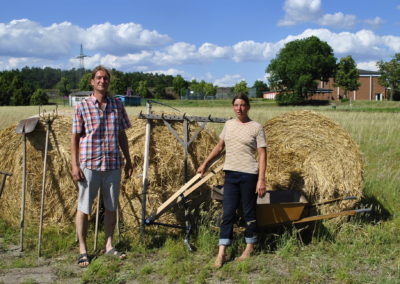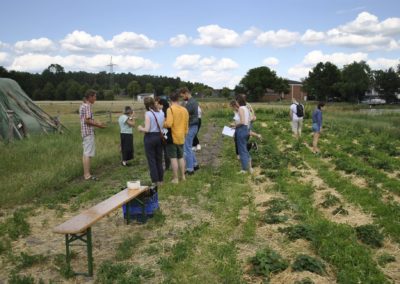Farm visit: Jens Wylegalla und Jule Winkler – Ahrensdorfer Kräuterwelt
We organise farm visits in the Berlin area which are specifically intended for gastronomes and farmers. Our aim is to share knowledge about agricultural cultivation methods, spark a conversation around product quality, and show the connection of individual ingredients to our whole food system. Through these farm visits, we bring producers and cooks closer together and nurture their mutual appreciation.
Our first farm visit on 22.06.2020 led us to Jens Wylegalla and Jule Winkler in the Ahrensdorfer Kräuterwelt, a vegetable and sheep farm. Jens and Jule grow salads, spices, herbs and vegetables from traditional and historic varieties. These are much more robust and better adapted to the dry and sandy Brandenburg soil. They do not use any chemicals, synthetical fertilizers, genetic engineering or biotechnology. The fruits have more time to ripen and thus develop an intense aroma. Through biodynamic cultivation, Jens and Jule have already achieved a significant improvement in soil fertility and manage to produce resistant plants that are tasty and nutritious despite the difficult growing conditions.
Their strawberries are served at Nobelhart & Schmutzig and other restaurants. They grow the varieties Schneewittchen, Ananaserdbeeren, Malvina, Florence und Elianni. Each variety stays on the same location for three years. To prevent nematodes, they plant clover as an undersown crop to the strawberries. In the beginning of June, they scatter straw or wool as an underlay. This prevents fungal infections, since the berries don’t touch the soil and thus do not get too wet. At the same time it improves the water storage capacity of the soil. After the harvest, the organic material is tilled into the soil, which helps to build up humus. Humus improves the soil structure and promotes biological activity, which makes the sandy soil more fertile.
The tomatoes are placed as seedlings in ditches filled with compost, fermented microorganisms, sulphur, boron and wool. The plants are burrowed in deep, leaving only two or three leaves over the ground. This stimulates root growth. The plants are not irrigated additionally, which means more work for the plants, but that’s not bad at all: as Jens says, “the taste of the fruit develops through the efforts of the plant.”
Jens and Jule gave us a warm welcome and took time to give us insights into their work. This allowed for exciting conversations and a pleasant exchange. We are very thankful for that!



